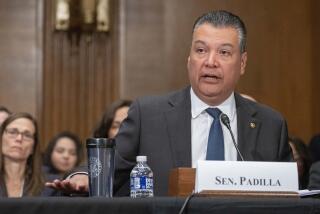Amid bailouts, banks spent big to thwart foreclosure legislation
Through the depths of the recession, major Wall Street banks and other financial institutions spent nearly $70 million in California to try to defeat or water down California legislation aimed at slowing real estate foreclosures.
The money, spent on lobbying fees and political contributions, came from 2007 to 2010 — at the same time the banks were getting billions of dollars in federal taxpayer bailouts to keep them from collapsing.
A report commissioned by the Alliance of Californians for Community Empowerment criticized the banks and mortgage lenders for spending the money in the political arena rather than working harder to keep people in their homes.
“There’s no doubt that the banking industry is spending millions of dollars in an effort to advance its agenda in Sacramento,” said Amy Schur, the alliance’s executive director. “Too often, their agenda means less regulation for the banks and more freedom to operate at will.
Dustin Hobbs, a spokesman for the California Mortgage Bankers Assn., defended the lobbying and contributions by banks and their allies.
“Everyone has a right to have a voice in important policy discussions — both consumers and businesses,” he said. “In California in recent years, we’ve seen a tremendous increase in the number of bills proposed that would have an impact on the real estate, finance industry.”
The financial institutions included in the study were Bank of America Corp., JPMorgan Chase & Co., Citigroup Inc., Wells Fargo & Co., Goldman Sachs Group Inc. and Morgan Stanley, as well as the California Bankers Assn., the California Independent Bankers and the California Mortgage Bankers Assn.
Over the four-year period, banks and financial institutions spent $23.3 million on lobbying and $45.9 million on campaign contributions to candidates, initiative campaigns, political party organizations and other groups.
An example of a bill the banks were against, Schur said, was SB 1275, sponsored by Senate President Pro Tem Darrell Steinberg (D-Sacramento) and Sen. Mark Leno (D-San Francisco). It would have required mortgage servicers to complete negotiations aimed at modifying a loan before moving to foreclose.
The bill got only 30 out of 41 needed votes to pass the Assembly, with 12 Democrats failing to vote on the proposal even though Steinberg was a top caucus leader.
“The banking industry and their lobbyists worked very, very hard in killing it,” Schur said. The bill has been re-introduced this year.
Hobbs said the California Mortgage Bankers Assn. has supported bills that helped homeowners, including a 2009 measure that required loan servicers and homeowners to talk directly with each other to try to prevent a foreclosure. The bill provided extra time for renters to stay in a house when a landlord had been foreclosed upon and gave cities tools to ensure that foreclosed properties were maintained.
Last year, the association supported a bill that allowed homeowners to sell their properties for less than the value of their original loan and not be required to still owe the difference to the bank, Hobbs said.
Another trade group, the California Bankers Assn., represents all the major banking institutions that operate in the state. Spokeswoman Beth Mills said that members of the group have participated in programs that “helped folks to stay in their homes whenever possible.”
There were half a million foreclosures in the state in 2010, and that total isn’t expected to change much this year, said Kevin Stein, associate director of the California Reinvestment Coalition, which advocates to bring equality in financial and housing services to low-income citizens.
“The reality is the banks are stronger in the Legislature than the consumer groups,” Stein said. “In a time of unprecedented crisis in mortgage lending and foreclosures, we should have seen better and more legislation from the folks in Sacramento.”
He said his group and its allies hope that the Democratic majorities in both houses of the Legislature and the new Democratic governor, Jerry Brown, will pass housing-related bills that previously died or were vetoed by former Republican Gov. Arnold Schwarzenegger.
“I think this year will be different because the problems have only gotten worse,” Stein said.
Times staff writer Nathaniel Popper contributed to this report.







